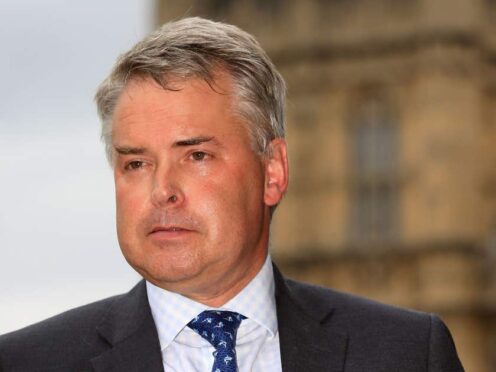A Conservative MP has suggested that taxpayers are being “scammed” by the Archbishop of Canterbury, amid questions over asylum seekers converting to Christianity.
Former minister Tim Loughton told Prime Minister’s Questions: “The Archbishop of Canterbury has admitted that since taking office, the attendance at the Church of England has dropped by 15% and in the 10 years to Covid, the number of baptisms in the Church of England has fallen from 140,000-a-year to 87,000.
“So Christianity in the UK seems to be on the wane unless apparently, you are from a Muslim country in the middle of an asylum claim.
“We’re now told one in seven occupants of the Bibby Stockholm have suddenly become practising Christians.
“Can I ask the Prime Minister that given that the Church of England has now issued secret guidance for clergy supporting asylum applications for these Damascene conversions, who is the church accountable to and are taxpayers being scammed by the Archbishop?”
Prime Minister Rishi Sunak replied: “When it comes to illegal migrants we need to have a system whereby if someone comes here illegally they shouldn’t be able to stay.
“I can tell him the Home Secretary has asked for more information about the extent to which migrants converting to Christianity is playing a role in our asylum system.

“And more generally under our Illegal Migration Act, anyone entering the UK illegally will not be granted asylum here. That’s why we need to have somewhere to send them and why our Rwanda scheme is so important.”
Mr Sunak earlier this week dodged questions on whether the Government should close a “loophole” in the immigration system amid suggestions asylum seekers are converting to Christianity to secure leave to remain in Britain.
It came as Dave Rees, whose name appears listed as an elder on the Weymouth Baptist Church website, said 40 asylum seekers on the Bibby Stockholm barge had come forward to become Christians.
Over the last week it has been disappointing to see the mischaracterisation of the role of churches and faith groups in the asylum system.
Churches up and down the country are involved in caring for vulnerable people from all backgrounds. For refugees and those seeking asylum,…
— Archbishop of Canterbury (@JustinWelby) February 7, 2024
The Archbishop of Canterbury, the Most Rev Justin Welby, later wrote on X, formerly Twitter: “Over the last week it has been disappointing to see the mischaracterisation of the role of churches and faith groups in the asylum system.
“Churches up and down the country are involved in caring for vulnerable people from all backgrounds. For refugees and those seeking asylum, we simply follow the teaching of the Bible, which is to care for the stranger.
“It is the job of the Government to protect our borders and of the courts to judge asylum cases.
“The church is called to love mercy and do justice. I encourage everyone to avoid irresponsible and inaccurate comments – and let us not forget that at the heart of this conversation are vulnerable people whose lives are precious in the sight of God.”
A Church of England spokesperson said: “Churches have no power to circumvent the Government’s duty to vet and approve applications. The responsibility for this rests with the Home Office.”
The Church of England also noted what was dubbed “secret guidance” by Mr Loughton has been publicly available on its website since it was first published seven years ago.
Bishop of Chelmsford Guli Francis-Dehqani earlier this week said it was “saddening” for politicians to claim a link between abuse in the asylum system and the actions of clergy in the wake of the case of Clapham chemical attack suspect Abdul Ezedi.
Dr Guli Francis-Dehqani said she makes no apology for the involvement of religious leaders in “supporting people who are often deeply vulnerable and traumatised”.
Ezedi, believed to be from Afghanistan, is said to have successfully challenged a Home Office decision to refuse him asylum in 2020 and was permitted to stay in the UK after a priest confirmed he had converted to Christianity and was reportedly “wholly committed” to his new religion.
